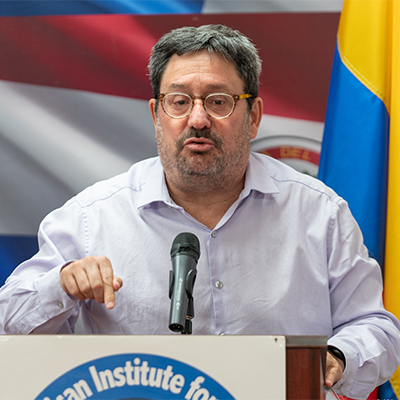Ecuador, Trump and Petro, three lessons

By: Francisco Santos - 20/04/2025
Share:
This past Sunday, right-wing Ecuadorian candidate Daniel Noboa defeated Luisa González, a 21st-century socialist candidate and Rafael Correa puppet, by more than 10 points. This election, along with some of Trump's actions in the United States, offer lessons that the opposition in Colombia must learn.
The first is the defeated candidate's response. She obviously didn't accept the result; she spoke of nonexistent fraud and a dictatorship. Colombian President Gustavo Petro says the same thing every time things don't go his way or the courts rule against him, as happened this past week when the Council of State denied him the use of private television to broadcast his cabinet meetings, which has become a bastion of propaganda.
Petro, in response to this ruling, said on Twitter: "Public affairs are public, don't censor them," and he also hinted that this censorship comes from courts that don't consider him president because he is a progressive and because his power comes from the popular vote. This latter statement echoes other pronouncements, such as the one he made regarding the dismissal of a mayor of his party in Duitama ordered by this same court. "Every decision will be respected, except a coup d'état," Petro said last December. He also hinted that a kind of soft coup is brewing in the high courts.
Petro wants and seeks a break with democratic institutions to remain in power or impose his candidate. The opposition must prepare for the election results to be ignored in 2026 if their candidate loses, which is unlikely to happen today, as they have the corrupt minister Armando Benedetti in charge of ensuring that doesn't happen. All possible actions must be prepared, although the first should be a Supreme Court ruling that, as evidence suggests, removes and imprisons this corrupt minister, who also serves as Minister of the Interior.
The other scenario is a democratic collapse due to this supposed "soft coup." In that instance, it will be up to Colombians to take to the streets to prevent dictatorship, as in Bangladesh or Sri Lanka, and business leaders to shut down the economy to create the conditions that prevent the end of democracy and freedoms, including free enterprise. Make no mistake, business leaders, this can happen, and you must be ready to support it without hesitation. In Venezuela, they thought the storm was over, and look at their situation, including the business leaders who openly or surreptitiously supported Chávez. The Colombian oligarchy—you, Mr. Business Leader—are the enemy.
We'll see how Ecuador ends, but the second lesson is not to be afraid of a firm hand. Noboa clearly stood up to drug trafficking and insecurity, and the vote of support is backing the fight against organized crime. Remember 2002? We shouldn't be afraid of a firm hand, as President Álvaro Uribe said. Colombia expects that, but for real, and not as a rhetoric that Santos and Duque used to come to power and then faded away.
The third lesson Donald Trump is teaching the United States is reforming state bureaucracy and the regulations that impede a country's development. Two main objectives in Colombia are environmental permits and prior consultations.
On the subject of environmental permits, an example: the agency in charge of the issue halted all construction work on the expansion of the North Highway in Bogotá. Unjustifiably, it was an ideological decision with the change of government. This affects millions of people who travel through the area and spend hours reaching the city, not to mention the avoidable flooding and the protection of wetlands that had been taken into account in the proposal to raise the lanes and maintain connectivity between the two affected wetlands.
The same can be said of the fracking projects that never came to fruition and, in truth, are also the responsibility of President Iván Duque and his Ministers of Mines and Energy. Today, Colombia would have gas reserves and wouldn't have to buy them at outrageous prices abroad, increasing the cost by 25 percent for citizens of all social strata. Licenses and prior consultations were used to prevent this project from moving forward, with the support of lukewarm leaders who, for the good of the country, failed to confront a minority sector that opposed it.
Prior consultations, moreover, are a business today, but this issue is easy to fix. The first step is to return to the partner communities a percentage of the project being consulted on, whether it's a highway or a fracking project, and this percentage is gradually reduced every three months that the approval isn't granted. And if at a certain point there's no agreement, for six months or a year at the most, the consultation is approved by the ministry, and the community is left with a minimal portion, having lost the rest by delaying the consultation, which is what happens today to extract more benefits. It's reversing the incentive.
We're almost a year away from the presidential elections. Let's prepare for the worst, and if it doesn't happen, so much the better. But let's not forget that Petro, Correa, Chávez, Ortega, and Morales never want to leave power. They're dictators or autocrats, and they'll seek ways to perpetuate themselves until the last second. Don't be naive, I repeat.
P.S. This column was written and submitted before Gustavo Petro refused to recognize the results of the Ecuadorian elections. Afterward, don't say you weren't warned.
«The opinions published herein are the sole responsibility of its author».